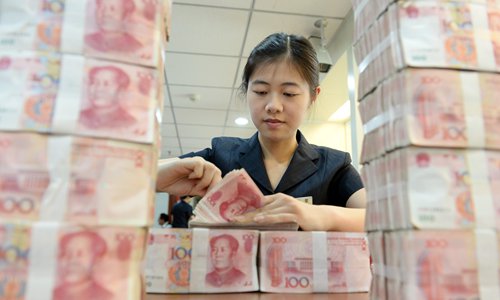HOME >> BUSINESS
Chinese policymakers need to narrow focus to capital market development
Source:Global Times Published: 2019/11/12 21:23:40

An employee counts money at a bank in Nanchong, Southwest China's Sichuan Province. File photo: VCG
The Chinese economy is facing downward pressure, which brings uncertainty to economic policy. Current policy focuses on multiple affairs including the trade war, poverty alleviation, technology and debt. Keeping track of too many issues means policy lacks concentration.Facing multiple problems, what should be acted on first? The capital market is the most pressing issue.
Capital will play a key role in achieving China's next goal. The capital needed for future development cannot rely on the traditional manner of attracting foreign investment. Investment brought in through traditional means is limited.
The flow of funds into the country through the capital market is larger in quantity and scale than that generated through traditional foreign investment. This kind of investment is what China needs now and in the future. Therefore, the construction of capital and the capital market should now be prioritized in policymaking.
A significant difference in scale between the capital markets of China and the US can be observed. In the equity market, the number of US-listed companies has decreased, but the total market value has been steadily rising. On the bond market, the nominal value of US Treasury bonds has reached $14 trillion. The market value of the corporate bond market is $8.5 trillion. Assets-backed securities products have been experiencing rapid growth, with mortgage-backed securities taking up the largest share. Derivatives have great variety with interest rate derivatives coming out on top. The Chinese capital market has a lot of work to do to catch up. According to data from Bloomberg, as of December 20, 2018, China's stock market was valued at $5.46 trillion. Its bond market is still behind that of the US.
Previous Chinese development has focused on industries and projects. The country's development in the future will depend more upon capital and the construction of the capital market. Instead of focusing on specific projects, attention should be paid to building up markets.
Despite the downward pressure China has encountered, there are still opportunities to come, with one important precursor: formulating and developing the capital market. If this issue is not solved first, there will be very limited leeway with a surplus of capital. Any fluctuation would cause turbulence in the market and society.
Therefore, the capital market is an important handhold and key for China's current development stage. Well-managed capital could absorb market volatility if problems occur down the line. Suppose there is an economic crisis, with a fully functioning capital market, it is possible to live with the crisis and avoid too much trouble. In contrast, a project-oriented economy will turn policymakers into venture capitalists. Chinese economic development will run into difficulties while following this model.
The importance of building up a capital market will become more prominent in the future. This will be determined by China's development stage. Policy will lose its focal point if the new measures are rolled out in multiple areas.
Many opinions and discussions may sway the process of the capital market's construction. Some may worry about national security in this regard. But if the capital market becomes problematic, national security could indeed be comprised.
Some have also implied that the development of the capital market could induce trouble and chaos. However, this can be solved through scheme design, policy practice and increased transparency. It is important that capital market strategy is not oscillated due to minor matters.
We hope that the Chinese policymakers can reach a consensus on capital market construction and reform. There should be consensus and determination that no matter how the China-US trade war goes, China's capital market development is an unshakable aim.
The article was compiled based on a report by Beijing-based private strategic think tank Anbound. bizopinion@globaltimes.com.cn
Posted in: EXPERT ASSESSMENT